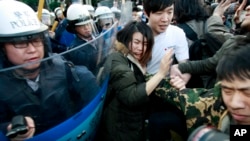Student protesters occupying Taiwan's parliament have agreed to meet President Ma Ying-jeou to resolve a political standoff over a controversial trade deal with China.
The president on Tuesday proposed the talks to help end the crisis, which began last week when the students stormed the legislature and demanded the government scrap the bill.
It was not immediately clear when the meeting will happen or what will be discussed. In his invitation, Ma made clear he would like the talks to be held without preconditions.
The development comes a day after riot police injured more than 100 people while clearing Taiwan's Cabinet offices, which students demonstrators had also seized.
Trade pact
The somewhat Beijing-friendly president has defended the trade pact as necessary, warning trade-reliant Taiwan would be economically isolated without such deals.
The protesters worry the trade agreement will hurt the Taiwanese economy. Many are also fearful of Beijing's growing influence.
The trade deal is part of the far-reaching Economic Cooperation Framework Agreement, or ECFA, signed between Taiwan and China in 2010.
Under the subdivision of the pact now under discussion, Chinese and Taiwanese service companies would increase investments in each other's territory.
The opposition has vowed to vote against the trade deal, but does not have the strength to block it.
Economic ties with China
Taiwan-China economic ties have been strong for years. Political relations have also grown warmer following historic high level talks last month.
Taiwan split from China following a civil war in 1949. Beijing still regards it as a breakaway province that will someday be reunified with the mainland.
Economic ties have improved in recent years, especially after Ma was elected president in 2008 and re-elected in 2012.
The president on Tuesday proposed the talks to help end the crisis, which began last week when the students stormed the legislature and demanded the government scrap the bill.
It was not immediately clear when the meeting will happen or what will be discussed. In his invitation, Ma made clear he would like the talks to be held without preconditions.
The development comes a day after riot police injured more than 100 people while clearing Taiwan's Cabinet offices, which students demonstrators had also seized.
Trade pact
The somewhat Beijing-friendly president has defended the trade pact as necessary, warning trade-reliant Taiwan would be economically isolated without such deals.
The protesters worry the trade agreement will hurt the Taiwanese economy. Many are also fearful of Beijing's growing influence.
The trade deal is part of the far-reaching Economic Cooperation Framework Agreement, or ECFA, signed between Taiwan and China in 2010.
Under the subdivision of the pact now under discussion, Chinese and Taiwanese service companies would increase investments in each other's territory.
The opposition has vowed to vote against the trade deal, but does not have the strength to block it.
Economic ties with China
Taiwan-China economic ties have been strong for years. Political relations have also grown warmer following historic high level talks last month.
Taiwan split from China following a civil war in 1949. Beijing still regards it as a breakaway province that will someday be reunified with the mainland.
Economic ties have improved in recent years, especially after Ma was elected president in 2008 and re-elected in 2012.





